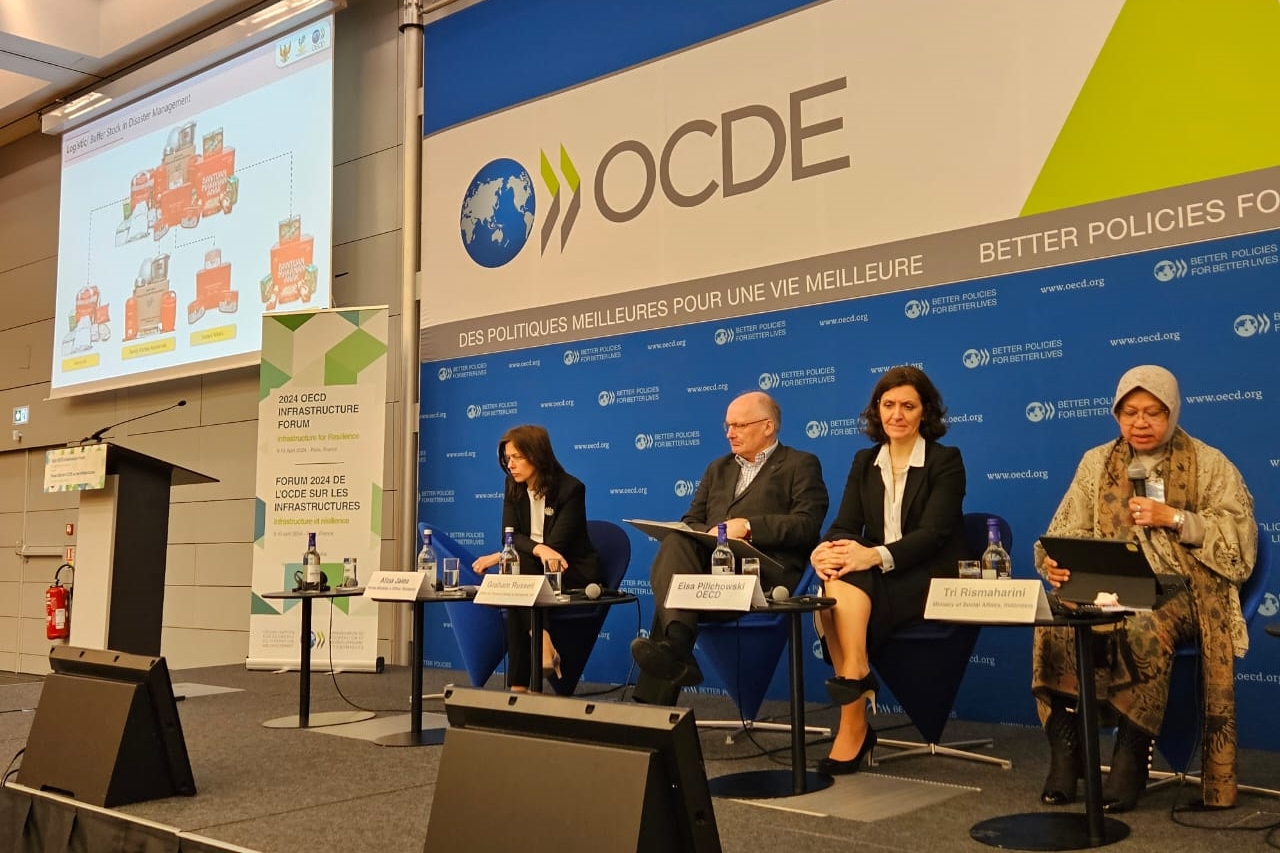Social Affairs Minister Explained Indonesia’s Disaster Management Experience at the OECD Infrastructure Forum in Paris

PARIS (10 April 2024) – Minister of Social Affairs Tri Rismaharini became the opening speaker of the second day of the Organization for Economic Cooperation and Development (OECD) Infrastructure Forum in Paris, France, Wednesday (10/4) morning, themed "Critical Infrastructure Resilience." The forum is held by the increase in disasters related to global warming, such as storms, floods, landslides, fires, and earthquakes that affect the ability of infrastructure to perform its functions, as well as the consequences of infrastructure failure, natural disasters, pandemics, and cyber-attacks.
Before becoming the Minister of Social Affairs, Tri Rismaharini had been invited by the OECD regarding Surabaya City Development. In the last three years, Risma has been invited by OECD many times as a speaker with topics ranging from Social Inclusiveness, Social Impact Start-ups, and Global Value Chain, to the current Infrastructure Forum. On this occasion, Social Affairs Minister Risma explained how to ensure weather resilience of infrastructure for all citizens.
Indonesia is the largest archipelago in the world in the Ring of Fire. Global warming has impacted Indonesia, such as floods, droughts, heat waves, storms, loss of economic potential in agriculture and tourism, and threats to public health. In addition, Indonesia faces various natural disasters such as earthquakes, volcanic eruptions, and tsunami. By 2023, Indonesia faced around 5,400 natural disasters, such as earthquakes, volcanic eruptions, floods, extreme weather, landslides, and forest fires. Geographical conditions and vulnerability to face disasters make Indonesia need to have disaster resilience towards the potential disruption and risk of infrastructure failure.
Social Affairs Minister Risma explained that the Indonesian Ministry of Social Affairs has prepared a social barn system 613, spread across 29 provinces. In addition, it also prepares buffer stocks, spread across 328 cities/regencies to help logistics in the event of a disaster and post-disaster. The contents range from food, clothing, tents, drinking water treatment, public kitchens, hygiene facilities such as washing machines, lighting systems using solar energy, and portable toilets. These logistics are needed for daily activity.
In addition, trauma healing, temporary places of worship, and emergency schools are also prepared which can be implemented during disaster management. In post-disaster handling, the Ministry of Social Affairs also provides earthquake-resistant housing assistance, and business training in the newly started conditions, to assist the community in restoring their lives.
In terms of controlling the handling of disaster impacts, the Ministry of Social Affairs gathers 25,008 Disaster Response Volunteer (Tagana) and is assisted by 49,916 Social Assistants who are connected to a digital Command Center system. Integration with BMKG has made it possible to mobilize resources, such as giving orders from directorates in the Ministry of Social Affairs, 37 technical implementation units (Integrated Centers / Centers and Large Centers), to Tagana and Social Assistance, and allows each human resource (HR) to provide reports quickly in about 10 minutes.
OECD moderator Elsa Pilichowski believes that OECD countries should learn from each other. Indonesia can be emulated and studied for its disaster management efforts. "OECD member countries must learn together to face the challenges ahead. We can learn from Indonesia," said Elsa.
Elsa also appreciated the efforts made by the Ministry of Social Affairs in handling disasters in Indonesia. "Of course, disaster management is very challenging. The efforts are very impressive, such as the Command Center and others," Elsa concluded.
 English
English
 Bahasa
Bahasa
